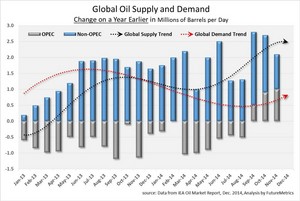Reports show impact of strong dollar, oil prices on pellet sector
Over the past week, FutureMetrics LLC has published two research papers by company President William Strauss; one published Jan. 12 on the impact of the strengthening dollar on utility and producer margins in the industrial pellet sector, and the other on Jan. 14 with three interactive dashboards related to where crude oil prices are going and its impact on pellets used for heating in the domestic market.
According to the first published paper, since most long-term offtake contracts for supply of industrial wood pellets from U.S. producers are paid in dollars, as the pound and euro weaken, the cost per ton in these currencies increases. Some of this currency risk can be hedged, but if the dollar continues to strengthen, as it is suggested it will, the paper indicates this will challenge profit margins.
Additionally, the weakening pound is pressure back through the supply chain to lower the dollar price of pellets. Research provided in the paper illustrates how a lower dollar price per ton of pellets will help the utility mitigate margin reduction. However, the pressure will impact existing and proposed U.S. production projects.
Strauss indicates new projects being developed should ensure they prove out input costs, process design, operator training, protocols and product delivery logistics costs. While, operational projects need to optimize each stop to lower the operating cost per ton and increase reliability, consistency and projection volumes.
In addition to the pound, the euro is shrinking at a similar rate. The paper concludes that with the dollar strong, the U.S. pellet export sector that supplies U.K. and EU buyers will require optimal best practices to be a part of the projected growth provided in the research.
Another research paper published a few days later addressed where crude oil prices are going and what the impact will be on the pellet-heating markets. Interpretation on this topic was provided with three interactive dashboards. The first dashboard allows interaction with the forecasts of global oil supply and demand in 2014 and 2013. A chart provided with the same data as the dashboard shows that the global supply trend increased, while global demand decreased, indicating why prices have been falling.
The second dashboard provided what a drop in crude oil prices means for the pellet-heating markets. The research shows that there is a high correlation between crude prices and heating oil prices, and that heating oil prices are close to the “indifference” point, where the cost of a unit of energy from heating oil is the same as the cost of a unit of energy from wood pellets. The interactive dashboard allows the two assumptions to be adjusted.
The last dashboard allows one to estimate the impact of heating oil prices on pellet demand. Information was provided on annual heating oil and pellet fuel cost delivered to the average home in the Northeast. The research indicated how much it would cost to heat the same sized home with heating oil or wood pellets. According to the paper, the last time pellets cost more than oil was in 2008, and it was transitory.
Strauss’s research concluded the wood pellet sector may experience a slowdown in demand growth if crude prices remain low. If heating oil prices drop far enough below the point of indifference, there may be a sudden decrease in wood pellet demand. The research included that states with high heating oil dependency and high use of pellet stoves are likely to experience switching if pellet prices remain unchanged and heating oil prices fall. However, Strauss emphasizes that low oil prices are temporary, and overtime pellets for heating will remain the lowest cost fuel.
Read More: Wood Pellet Fuel




